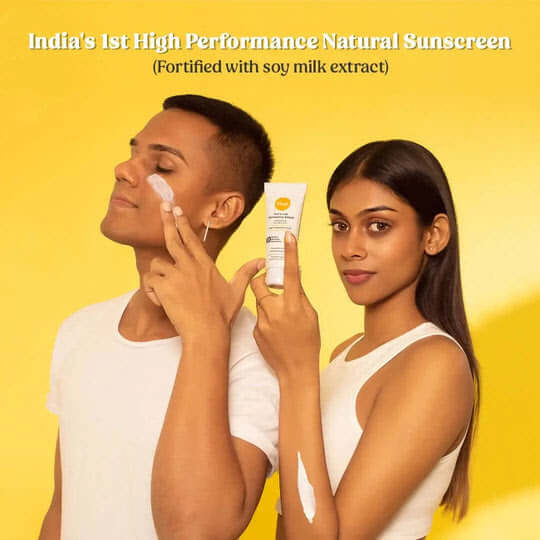We have said this a thousand times, but we don't mind repeating it once again, you need sunscreen no matter if it's sunny or cloudy outside. While shielding your skin from UV rays is important, finding the best sunscreen that does not trigger acne may be challenging.
In this blog post, we will look at the factors to consider when selecting sunscreen for acne-prone skin and how to choose sunscreen for acne-prone skin. By understanding the ingredients, SPF levels, and formulation options, you can make informed decisions and achieve healthy, protected skin without compromising your complexion.
Why is using sunscreen necessary for acne-prone skin?
It's important to understand why sunscreen is an essential skin care product before figuring out the best sunscreens for acne-prone skin. Firstly, it acts as an essential shield against the sun's dangerous UV rays, which can lead to sunburn, skin cancer, and premature aging. Skins prone to acne are frequently more delicate and prone to inflammation, so UV protection is crucial.
The dark spots or patches left behind by acne outbreaks are known as post-inflammatory hyperpigmentation that can be avoided by wearing sunscreen. These pigmented patches may worsen as a result of UV exposure, becoming more noticeable and persistent. By using sunscreen every day, you can prevent post-inflammatory hyperpigmentation and help existing spots fade more quickly.
Skin prone to acne tends to get sensitive and irritated, and sun exposure can exacerbate these issues. Regular application of sunscreen helps lower inflammation, contributing to the maintenance of a smoother complexion.
Regular sunscreen use helps balance sebum production. Too much sun exposure can dehydrate the skin, triggering an overproduction of sebum, clogged pores, and acne breakouts. By applying sunscreen, you can keep your hydration levels in check, avoid overproducing sebum and promote clear pores. You can find organic body care products online without any hassle.
How do you choose the best sunscreen for your acne-prone skin?
Look for non-comedogenic formulas
If you have acne-prone skin, it's essential to get sunscreen with the "non-comedogenic" label. These formulations have been carefully created to minimize pore blockage and reduce the possibility of outbreaks. They are lighter in texture and less likely to cause acne. Search for words like "oil-free" or "non-greasy" on the product labels as they are lightweight and less likely to clog pores.
Choose hybrid sunscreen
Ingredients in Hybrid sunscreens lay on top of the skin to form a physical barrier that reflects and disperses the sun's rays. These sunscreens are far less likely to irritate the skin or cause acne outbreaks. They are also suitable for sensitive skin. Look for Hybrid sunscreens with broad-spectrum protection from UVA and UVB radiation. Choose a hybrid sunscreen next time when u buy skin care products online.
Consider SPF levels
SPF rates how well a sunscreen blocks UVB rays, the primary cause of sunburn. While higher SPF numbers provide more protection, it's important to remember that SPF 30 and SPF 50 offer slightly different levels of protection. SPF 30 offers 97% UVB protection, whereas SPF 50 offers around 98%. Focus on using a suitable amount of sunscreen and reapplying it every two hours, especially during prolonged sun exposure.
Avoid harsh chemicals
Several chemical sunscreens, such as oxybenzone and avobenzone, may irritate acne-prone skin. These ingredients can result in irritation, redness, or breakouts. Choose sunscreens with more natural ingredients that are safe for your skin. Always look at the ingredient list and select products that don't contain any potentially irritating ingredients. Try to use natural face care products to avoid skin problems.
Consider additional skin benefits
Some sunscreens provide extra skincare advantages that can be helpful for acne-prone skin. Look for sunscreens that are non-comedogenic, fragrance-free, and leave no residue. These qualities can improve your skincare routine and potentially reduce the signs of acne. However, always exercise caution and patch-test new products to ensure no adverse reactions occur.
Conclusion
Choosing the best sunscreen for acne-prone skin is crucial for maintaining protected and healthy skin. Now you have a clear idea of which sunscreens are best for acne-prone skin. By selecting a sunscreen that not only shields you from harmful UV rays but also supports the needs of your skin, you can achieve optimal results. Consider non-comedogenic formulas, hybrid sunscreen, and SPF levels, and avoid harsh chemicals. Additionally, look for sunscreens with extra skin benefits to enhance your skincare routine. Remember to make a well-informed choice and prioritize the health of your skin.
Try Vilvah Melt-in-Milk Sunscreen with PA+++ best sunscreen for acne-prone skin. It is a high-performing natural sunscreen that you cannot afford to miss. Don't compromise when it comes to protecting your skin. Choose SunShield and embrace worry-free days under the sun.


 Track Order
Track Order












Leave a comment
All comments are moderated before being published.
This site is protected by hCaptcha and the hCaptcha Privacy Policy and Terms of Service apply.